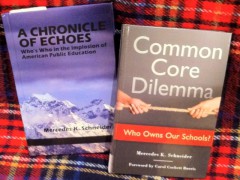Joint Statement from 8 Elite DC High Schools: “We’re Phasing Out AP Courses”
The College Board’s AP testing has become popular– and that’s a problem, according to eight elite, Washington, DC, high schools. Many colleges apparently no longer consider AP-course completion to be a mark of distinction, or– as the eight elite DC high schools note in their joint announcement– many colleges no longer consider AP course completion as “noteworthy.”

In other words, mainstreaming the AP test is contributing to its undoing, at least among the high-end private schools. And there’s more:
These elite schools don’t like what has become the reality for public education nationwide: namely, the content cram associated with test prep. The eight elite DC schools are “convinced that focusing on a timed standardized test does not promote inquiry or higher-level discussion among students.”
They are right.
America’s public high schools should demand the same.
Joint Announcement – June 18, 2018
Today, eight Washington-area independent schools — Georgetown Day, Holton-Arms, Landon, Maret, National Cathedral, Potomac, St. Albans, and Sidwell Friends — announce our shared commitment to eliminate Advanced Placement (AP) courses from our curricula by 2022. As the heads of these schools, we have been meeting regularly over the past several years to discuss educational research and compare experience. One topic on which we all agree is the diminished utility of AP courses and the desirability of developing our own advanced courses that more effectively address our students’ needs and interests.
Collectively, we believe a curriculum oriented toward collaborative, experiential, and interdisciplinary learning will not only better prepare our students for college and their professional futures, but also result in more engaging programs for both students and faculty. We expect this approach will appeal to students’ innate curiosity, increase their motivation, and fuel their love of learning.
When introduced in the early 1950s, the AP program was intended to offer particularly ambitious students an opportunity to pursue and receive credit for college-level work, allowing them to graduate from college early. Yet today, few college students graduate in less than four years. Further, each college has its own policy as to how, or if, credit is awarded for AP tests, with some top schools no longer offering any credit at all. Nevertheless, many of our students feel compelled to take AP courses in the mistaken belief that failing to do so may hurt their college prospects.
In truth, with nearly 40% of high school students now taking these courses, the AP designation has become less noteworthy to college admissions officers. Our own survey of almost 150 colleges and universities confirms this. We have been assured by admissions officers that this change will have no adverse impact on our students. The real question for colleges is not whether applicants have taken AP courses, but whether they have availed themselves of their high schools’ most demanding classes.
The perception that colleges demand AP courses leads many students, perhaps reluctantly, to pass up other classes they might find more intellectually transformative and rewarding. Concurrently, because AP tests loom so large, faculty teaching these courses often feel pressed to sacrifice in-depth inquiry in order to cover all the material likely to be included on the test. This runs counter to the fact that college courses demand critical thinking and rigorous analysis. AP courses, by contrast, often stress speed of assimilation and memorization. While we acknowledge the recent attempts to develop more skill-based AP tests, we are convinced that focusing on a timed standardized test does not promote inquiry or higher-level discussion among students. Moving away from AP courses will allow us to offer a wider variety of courses that are more rigorous and enriching, provide opportunities for authentic engagement with the world, and demonstrate respect for students’ intellectual curiosity and interests.
Finally, we have the benefit of the experience of the many other excellent and well-known boarding and day schools across the country that already have transitioned away from AP courses over the past decade. These schools report positive results, with no negative impact on college placement. Our aim in making this announcement jointly and publicly is to lend our collective voice to this important educational movement and help pave the way for other schools considering a similar change. We hope you will be as enthusiastic as we are about this important milestone.
“Our aim in making this announcement jointly and publicly is to lend our collective voice to this important educational movement and help pave the way for other schools considering a similar change.”
A wonderful thought.

________________________________________________________________________________


I think that note ought to read:
Dear David,
It’s over
N’est-ce pas?
I like it. 🙂
My oldest graduated high school in 2005 and had enough AP credits accepted by Wellesley College that she was able to graduate in three years. However, the reputation of the Boston public high school she attended likely had more to do with their acceptance of those credits than the AP’s themselves.
Four years later when my younger daughter began the college search, the elite schools were already telling her “that credential has been devalued”. She had attended the same high school as her sister, and it was that the colleges were most interested in.
Glad those private schools are finally catching on!
I have to disagree.
That is, I disagree on the basis of my experience teaching AP U.S. Hist between 1986 and 2010 and student & teacher reports about the other AP courses at Wilson HS in DCPS: Eng Grammar, Eng Lit, Bio, Calc AB & BC, World Hist, French Lang, Span Lang.
Re AP Eng, I recommend to all the 2 books, one on each AP Eng course, that Joe Riener, my colleague at WHS, wrote. He describes the course and rationale for the readings he assigned and the writing assignments. He also addresses the obstacle to teaching and learning that the IMPACT evaluation creates. From his website:
Vol 1: Teach Me How to Work and Keep Me Kind, the possibilities of literature and composition in an American high school; excerpted article in the American Educator
Vol 2 is, Puzzle me the Right Answer to That One.
[[Many colleges apparently no longer consider AP-course completion to be a mark of distinction, or … “noteworthy.”]]
True. Depending on the college, the reasons include:
1) Some AP courses have been watered down;
2) School systems, e.g. DCPS, require students in all high schools to take AP courses, regardless of readiness or interest; they promote the illusion that enrollment in AP courses makes them “college ready”;
3) Advanced standing means that some freshman level college courses are under-enrolled
[[… mainstreaming the AP test is contributing to its undoing, at least among the high-end private schools….]]
If “mainstreaming” means making AP courses more widely available to students ready for and willing to do college-level work, then their opposition is elitist.
If it means enrolling students who are below grade level or, as one DCPS hs has done for years, enrolling every student, including limited English speakers, in the AP English courses, then it’s not “mainstreaming”; it’s manipulation.
[[These elite schools don’t like … content cram associated with test prep. … “focusing on a timed standardized test does not promote inquiry or higher-level discussion among students.”]]
Inquiry and discussion are classroom learning activities, not test activities. In any subject, students have to know the materiel, i.e. the facts, in order to have “higher-level discussions” – including how to distinguish fact from opinion and to understand how our current president abuses facts and disregards evidence.